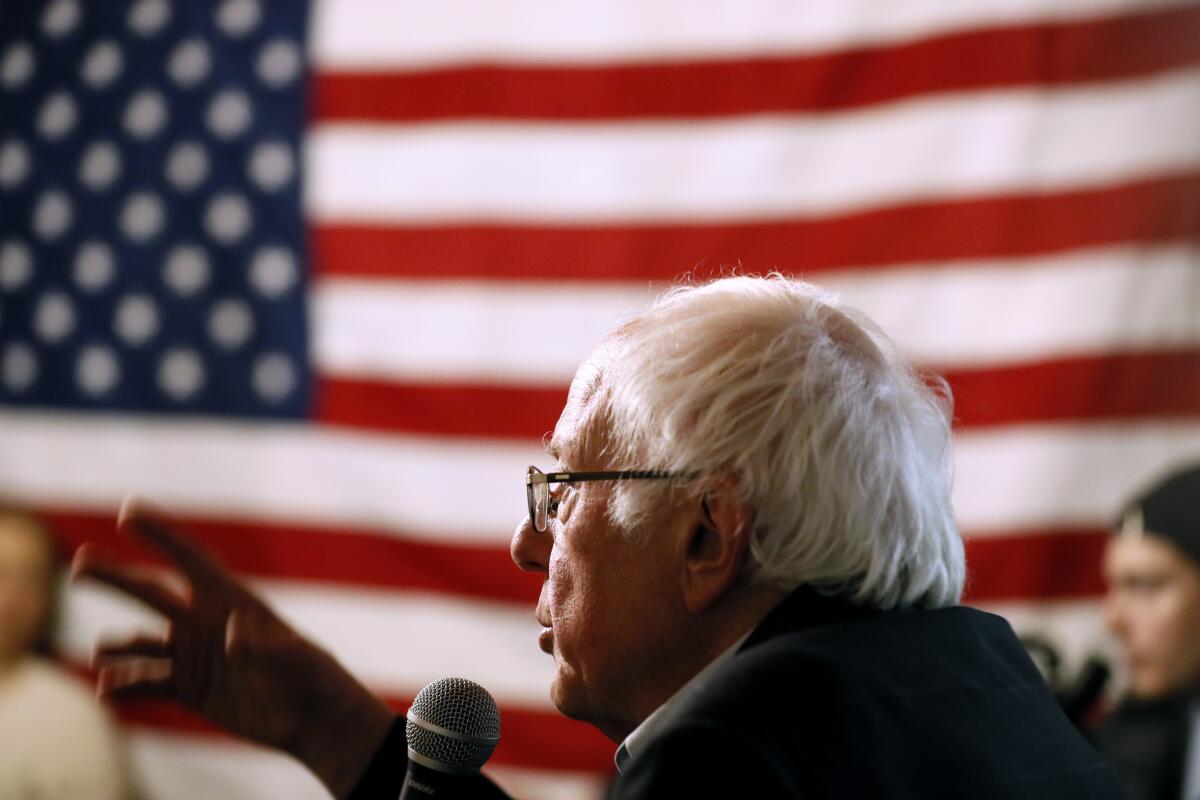Column: The world according to Bernie

WASHINGTON — For most of his 29 years in Congress, Bernie Sanders was mainly a left-wing gadfly, a relentless critic of the bipartisan Cold War consensus and a defender of regimes that resisted U.S. power.
When he ran for president four years ago, the senator from Vermont barely mentioned world affairs; his campaign website didn’t even have a foreign policy page for several months.
Since then, Sanders has evolved. In speeches, articles and interviews, he’s been working out a theory of what the U.S. role in the world should be after the “endless wars” in Afghanistan and Iraq are brought to an end, a step that remains his starting point.
He hasn’t declared a Sanders Doctrine, but he’s come close. And now that he has a real chance of winning the Democratic nomination, it’s worth a serious look.
He’s still anti-interventionist, but not isolationist. He wants the United States to engage in the outside world, but with far less recourse to military force.
He’s a multilateralist; he believes the United States should always act with other countries — and, when possible, through the United Nations.
Although he often reminds voters he’s the only candidate who voted against the 2003 invasion of Iraq, he’s not a pacifist.
He has supported military action in cases of genocide (Bill Clinton’s war against Serbia in 1999) and terrorism (George W. Bush’s invasion of Afghanistan in 2001, Barack Obama’s war against Islamic State in 2014).
He backed the war in Afghanistan through most of the Obama administration, but concluded that it was a mistake to let it continue so long.
One pillar of the Sanders Doctrine sounds traditional, a return to a bedrock principle that both parties shared before the rise of Donald Trump.
“As the wealthiest and most powerful nation on Earth, we have got to help lead the struggle to defend and expand a rules-based international order,” he said in 2017 at Westminster College in Missouri, in his first big foreign policy speech.
Another tenet is untraditional: making foreign policy an extension of the domestic “political revolution” Sanders wants.
“We need to counter oligarchic authoritarianism with a strong global progressive movement,” he said at Johns Hopkins University in 2018. “We must … reconceptualize a global order based on human solidarity.”
If Sanders is elected, we’d probably see the most dramatic changes in the Middle East. He wants to end uncritical U.S. support for two longtime allies, Israel and Saudi Arabia.
Sanders, who is Jewish and spent several months on a kibbutz in 1963, says he’s “pro-Israel.” But he opposes the hawkish government of Benjamin Netanyahu, whom he has called “a racist.” He says he’d make U.S. policy “evenhanded” and try to broker a deal to create a Palestinian state.
Like all of the Democratic candidates, Sanders says he’d try to revive the 2015 nuclear deal with Iran that Trump has abrogated. What’s more, he says he’d try to arrange a working relationship between regional rivals Iran and Saudi Arabia, which he has called “a brutal dictatorship … [that] is not a reliable ally.”
If Sanders wins the nomination, Trump and other Republicans will accuse him, accurately, of being a socialist. They’ll call him soft on defense, a traditional GOP attack on all Democratic candidates. But Sanders will have a comeback: He’ll ask Trump why it took him so long to keep his promise to bring U.S. troops home.
If Sanders wins the White House, his presidency would mark a huge change from Trump — a return to a foreign policy resembling President Obama’s in many respects.
Sanders would reaffirm the importance of NATO to U.S. security, and restore human rights and democracy promotion as U.S. goals. And he’d try to work through the United Nations — a nostalgic aspiration that may be difficult to fulfill amid the mounting U.S. rivalry with Russia and China, which have veto power on the Security Council.
But in other ways, Sanders would bring surprising continuity. Like Trump, he would disengage U.S. troops from the Middle East. Like Trump, he says he would be quick to use tariffs as a weapon in trade wars.
And the Sanders presidency would be the third in a row in which a president deliberately sets out to downsize U.S. ambitions and reduce U.S. commitments.
If that day comes, romantics will cross their fingers and pray that President Sanders succeeds. Cynics will cover their eyes and wait for him to collide with reality in the Middle East and other places where the balm of human solidarity is too often hard to find.
More to Read
Get the L.A. Times Politics newsletter
Deeply reported insights into legislation, politics and policy from Sacramento, Washington and beyond. In your inbox three times per week.
You may occasionally receive promotional content from the Los Angeles Times.











